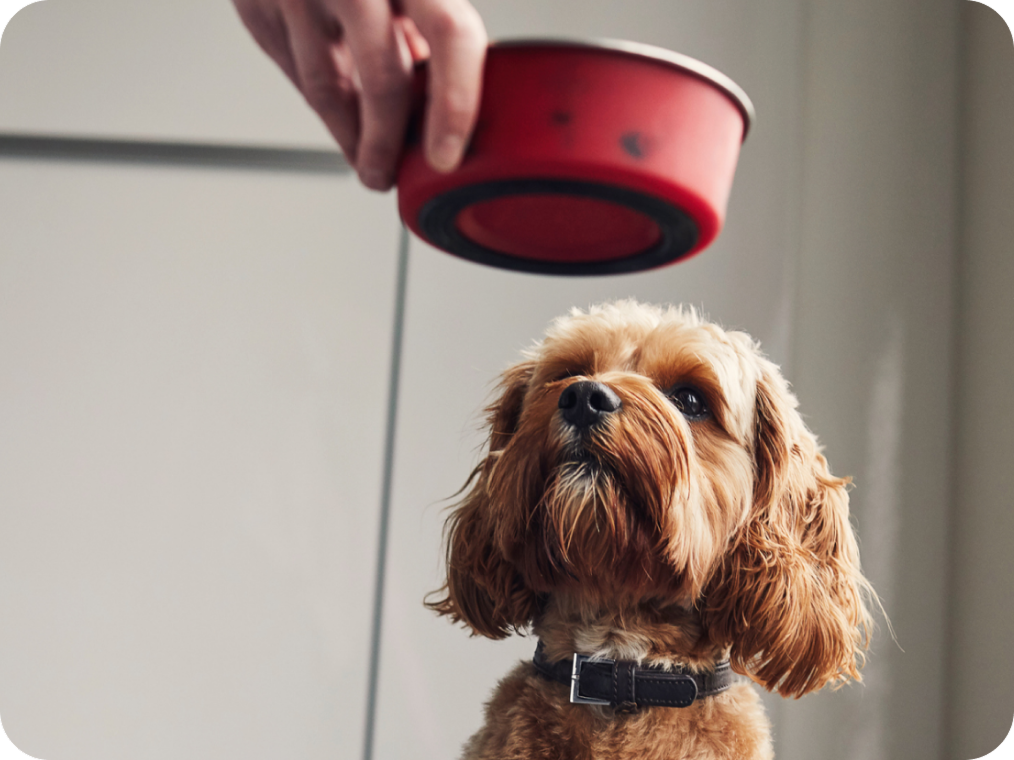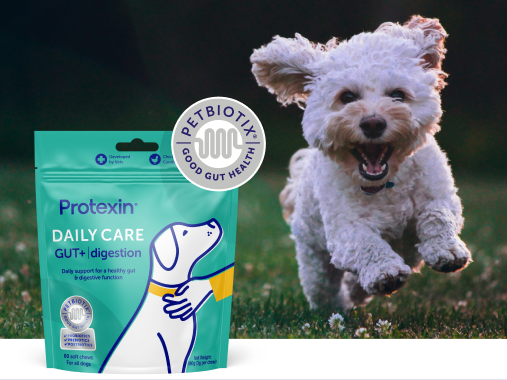
Why is it important to support your pet's gut health?
The gut microbiome is made up of microorganisms (such as bacteria) that help keep every cat and dog's digestive and immune systems health - with wide-ranging impacts on the rest of their body.

Supported immunity

Regulated behaviour

Better digestion
Inside Petbiotix®
Petbiotix® is Protexin’s unique and scientifically developed gut-boosting blend of prebiotics, probiotics and clinically proven postbiotic strains that help support the natural balance in your pet’s gut and keep them full of life.
Top tips for taking care of your pet's gut health

BALANCED DIET

FEEDING ROUTINE

REGULAR EXERCISE
References
1. Mondo et al. (2020) Gut microbiome structure and adrenocortical activity in dogs with aggressive and phobic behavioural disorders. Heliyon. DOI10.1016/j.heliyon.2020.e03311
2. Ambrosini et al. (2019) The gut-brain axis in neurodegenerative diseases and relevance of the canine model: a review. Frontiers in Ageing Neuroscience. DOIhttps://doi.org/10.3389/fnagi.2019.00130
3. Jeffery et al. (2017) The association of specific constituents of the fecal microbiota with immune-mediated brain disease in dogs. PLoS One. DOIhttps://doi.org/10.1371/journal.pone.0170589
4. Kubinyi et al. (2020) Gut microbiome composition is associated with age and memory performance in pet dogs. Animals. DOIhttps://doi.org/10.3390/ani10091488
5. Garcia-Belenguer et al. (2021) Gut microbiota in Canine Idiopathic Epilepsy: Effects of Disease and Treatment. Animals. DOIhttps://doi.org/10.3390/ani11113121
6. Kelley et al. (2012) Effects of Varying Doses of a Probiotic Supplement Fed to Healthy Dogs Undergoing Kenneling Stress. Journal of Applied Research in Veterinary Medicine. 10:3 205-216
7. Rose et al. (2017) Efficacy of a Probiotic-Prebiotic Supplement on Incidence of Diarrhea in a Dog Shelter: A Randomised, Double-Blind, Placebo-Controlled Trial. Journal of Veterinary Internal Medicine. DOI10.1111/jvim.14666
8. Lee. AH et al. (2022) Dietary supplementation with fiber, “biotics” and spray-dried plasma affects apparent total tract macronutrient digestibility and the fecal characteristics, fecal microbiota, and immune function of adult dogs. Journal of Animal Science 100(3). DOI:https://doi.org/10.1093/jas/skac048
9. Kelley et al. (2009) Clinical benefits of probiotic canine-derived Bifidobacterium animalis strain AHC7 in dogs with idiopathic diarrhea. Veterinary Therapy. DOIhttps://doi.org/10.5167/uzh-31198
10. Herstad et al. (2010) Effects of a probiotic intervention in acute canine gastroenteritis – a controlled clinical trial. Journal of Small Animal Practice DOIhttps://doi.org/10.1111/j.1748-5827.2009.00853.x
11. Gomez-Gallego et al. (2016) A canine-specific probiotic product in treating acute or intermittent diarrhea in dogs. A double-blind, placebo-controlled, efficacy study. Veterinary Microbiology. DOI https://doi.org/10.1016/j.vetmic.2016.11.015
12. Nixon et al. (2019) Efficacy of an orally administered anti-diarrheal probiotic paste (Pro-Kolin Advanced) in dogs with acute diarrhea: A randomised, placebo-controlled double-blinded clinical study. Journal of Veterinary Internal Medicine DOIhttps://doi.org/10.1111/jvim.15481
13. Schmalberg et al. (2019) A randomised double-blinded placebo-controlled clinical trial of a probiotic or metronidazole for acute canine diarrhea. Frontiers in Veterinary Science. DOIhttps://doi.org/10.3389/fvets.2019.00163
14. Arslan et al (2012) Therapeutic effects of probiotic bacteria in parvoviral enteritis in dogs. Rev Med Vet-Toulouse, 2(163), pp.55-9

